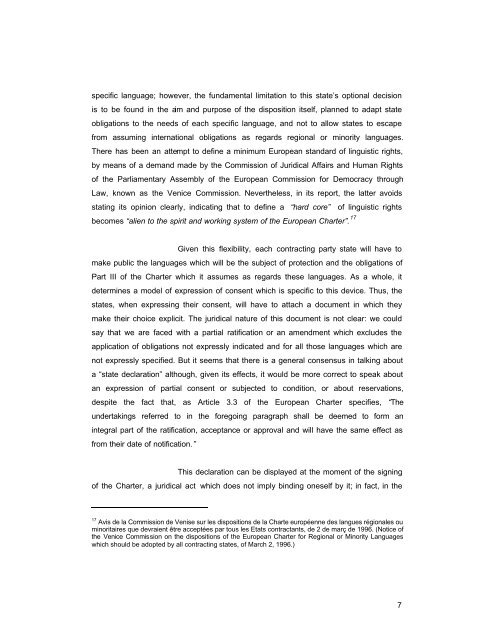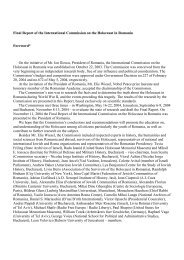get PDF document - MIRIS
get PDF document - MIRIS
get PDF document - MIRIS
You also want an ePaper? Increase the reach of your titles
YUMPU automatically turns print PDFs into web optimized ePapers that Google loves.
specific language; however, the fundamental limitation to this state’s optional decision<br />
is to be found in the aim and purpose of the disposition itself, planned to adapt state<br />
obligations to the needs of each specific language, and not to allow states to escape<br />
from assuming international obligations as regards regional or minority languages.<br />
There has been an attempt to define a minimum European standard of linguistic rights,<br />
by means of a demand made by the Commission of Juridical Affairs and Human Rights<br />
of the Parliamentary Assembly of the European Commission for Democracy through<br />
Law, known as the Venice Commission. Nevertheless, in its report, the latter avoids<br />
stating its opinion clearly, indicating that to define a “hard core” of linguistic rights<br />
becomes “alien to the spirit and working system of the European Charter”. 17<br />
Given this flexibility, each contracting party state will have to<br />
make public the languages which will be the subject of protection and the obligations of<br />
Part III of the Charter which it assumes as regards these languages. As a whole, it<br />
determines a model of expression of consent which is specific to this device. Thus, the<br />
states, when expressing their consent, will have to attach a <strong>document</strong> in which they<br />
make their choice explicit. The juridical nature of this <strong>document</strong> is not clear: we could<br />
say that we are faced with a partial ratification or an amendment which excludes the<br />
application of obligations not expressly indicated and for all those languages which are<br />
not expressly specified. But it seems that there is a general consensus in talking about<br />
a “state declaration” although, given its effects, it would be more correct to speak about<br />
an expression of partial consent or subjected to condition, or about reservations,<br />
despite the fact that, as Article 3.3 of the European Charter specifies, “The<br />
undertakings referred to in the foregoing paragraph shall be deemed to form an<br />
integral part of the ratification, acceptance or approval and will have the same effect as<br />
from their date of notification.”<br />
This declaration can be displayed at the moment of the signing<br />
of the Charter, a juridical act which does not imply binding oneself by it; in fact, in the<br />
17 Avis de la Commission de Venise sur les dispositions de la Charte européenne des langues régionales ou<br />
minoritaires que devraient être acceptées par tous les Etats contractants, de 2 de març de 1996. (Notice of<br />
the Venice Commission on the dispositions of the European Charter for Regional or Minority Languages<br />
which should be adopted by all contracting states, of March 2, 1996.)<br />
7












